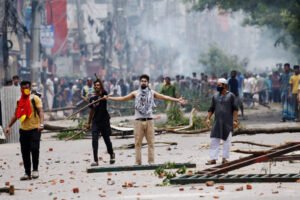
Bangladesh Crisis: Latest Updates and News
The ongoing crisis in Bangladesh has been marked by significant developments, including student-led protests, a change in government, and economic instability. Here’s a comprehensive overview of the latest updates and news:
Student Protests and Government Response
- Protests Over Job Quotas:
- Student protests against the job quota system in Bangladesh have escalated into the country’s worst unrest in years. The protests, which began over the contentious quota system for government jobs, have seen violent clashes between students and paramilitary personnel, resulting in injuries and deaths.
- Despite the top court reducing the quotas, student leaders insist they won’t back down until key demands, including the release of detained students, are met.
- Government Crackdown:
- The government has responded with a deadly crackdown, leading to a communications blackout and severe restrictions on public gatherings. The situation has been described as a severe disruption to normal life, with government buildings torched and telecommunications disrupted.
Change in Government and Economic Impact
- Sheikh Hasina’s Exit:
- Former Prime Minister Sheikh Hasina resigned and fled to India amidst mass protests, marking a significant shift in Bangladesh’s political landscape. The interim government, led by Nobel-winning banker Muhammad Yunus, is now in charge.
- Hasina’s administration left behind significant economic challenges, including a high debt burden of 18.36 trillion taka ($153 billion) and a low tax-to-GDP ratio of 7.3%, one of the lowest in the world.
- Economic Clean-Up:
- The new government is focusing on an economic clean-up, examining data anomalies that allegedly inflated economic performance during Hasina’s regime. Economist Debapriya Bhattacharya has been tasked with producing a white paper on the mismanagement and corruption under Hasina’s rule.
- Bangladesh is struggling with macroeconomic instability, inflation, and a dearth of foreign exchange reserves. The country is in talks with the International Monetary Fund for additional emergency aid.
Educational Institutions Reopen
- Month-Long Closure:
- Educational institutions in Bangladesh were closed for over a month due to the violence and unrest. However, they reopened on August 18, 2024, following a directive from the Ministry of Education.
- The reopening of schools and universities marks a step towards normalcy, although the academic calendar has been significantly disrupted.
International Diplomacy and Concerns
- India’s Role:
- India has been closely monitoring the situation in Bangladesh, with Prime Minister Narendra Modi discussing the crisis with US President Joe Biden. Modi emphasized the need for normalcy and raised concerns about the security of Hindus in Bangladesh
1
.
- India’s role as a neighbor and its potential as a mediator in peace talks have been highlighted, reflecting its growing influence in regional diplomacy
Conclusion
The crisis in Bangladesh is multifaceted, involving political instability, economic challenges, and social unrest. As the country navigates this tumultuous period, it is crucial to stay updated on the latest developments. The ongoing protests, change in government, and economic clean-up efforts are key areas to watch for anyone interested in understanding the current situation in Bangladesh. This article provides a detailed look at the latest updates and news surrounding the Bangladesh crisis, making it a valuable resource for those seeking to understand the complexities of the situation.